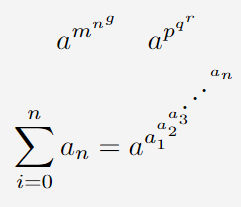You need to use the bace^exponent command to print the superscript in a latex document.
| Symbol/Unicode | Superscript(Power) |
|---|---|
| Type of symbol | Mathematics |
| Package (requirement) | No |
| Argument | No |
| Latex command | a^n |
| Example | a^2 → a² |
Use ^ symbol for superscript
Here a is the base and n is the exponent, use ^ key on the keyboard between base and exponent.
An excerpt of how to use it is shown below.
\documentclass{article}
\begin{document}
\[ \verb|a^n|\rightarrow a^n \quad \verb|a^3|\rightarrow a^3 \]
\[ \verb|sum^n|\rightarrow \sum^n \quad \verb|\prod^n|\rightarrow \prod^n \]
\[ \verb|\Lambda^0|\rightarrow \Lambda^0 \quad \verb|\bigcap^n|\rightarrow \bigcap^n \]
\end{document}Output :
How to use more than one character as superscript
To use a character as a superscript, writing like this a^n is printed in the document an.
But when you want to use more than one character as a superscript then you have to enclose the characters in curly brackets {}. like this a^{mn}.
And if you don’t enclose the characters in curly brackets then the first character will be valid as a superscript and the remaining characters will be printed as normal text.
like this a^mn → amn. Some more examples are given below for ease of understanding
\documentclass{article}
\begin{document}
\[ \verb|a^mn|\rightarrow a^mn \quad \verb|a^mng|\rightarrow a^mng \]
\[ \verb|a^{mn}|\rightarrow a^{mn} \quad \verb|a^{mng}|\rightarrow a^{mng} \]
\[ \verb|\sum^{\mu\beta}|\rightarrow \sum^{\mu \beta} \]
\end{document}Output :
Double or multiple superscripts in LaTeX
If you want to print ![]() then you have to write like this
then you have to write like this a^{n^2}. Below are more examples of using multiple superscripts.
\documentclass{article}
\usepackage{yhmath}
\begin{document}
\[ a^{m^{n^g}} \quad a^{p^{q^r}} \]
\[ \sum_{i=0}^n a_n = a^{a_1^{a_2^{a_3^{\adots^{a_n}}}}} \]\end{document}Output :


